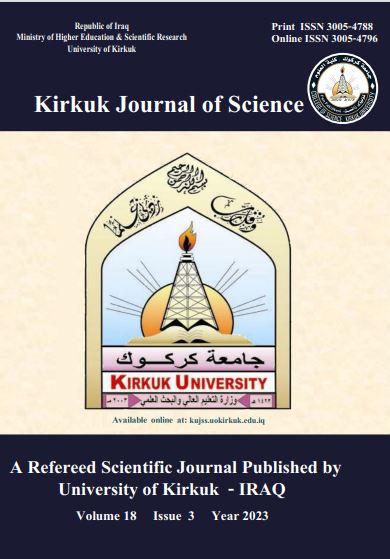Abstract
Coronavirus infection a new infectious illness brought on by the
SARS-COV-2 virus has infected people worldwide as of 2019, a covid-19
disease is associated with hematological and biochemical parameters
changes. The present study aimed to evaluate the possible relationship
between patient parameters and disease severity. A total of 200
nasopharyngeal swabs and whole blood specimens were collected from
individuals suspected of CoV-2 and healthy volunteers as control of both
sexes, grouped into four groups:50 patients for each mild, moderate,
and severe patients and 50 healthy volunteers. The current study
demonstrated that female 82(55%) was more frequently affected than
male 68(45%). Hematological parameters including white blood cell
count (WBC), granulocyte count, and Red blood cell distribution width
(RDW%) (increased significantly p value< 0.05, while Lymphocyte count
decreased significantly when compared with a control group. Significant
differences in hemoglobin concentration, packed cell volume, red
blood cell count, and indices of red blood cell count were shown when
compared with a control group in both sexes. Regarding biochemical
parameters including serum vitamin D, ferritin, D-dimer, procalcitonin
(PCT), and liver function tests, serum vitamin D decreased significantly,
while serum ferritin, D-dimer, procalcitonin and liver enzymes increased
significantly in the covid-19 patients group compared to the control group.
According to vitamin D receptor, gene polymorphism in covid-19 patients
genotype Bb was most likely associated and strongly related to getting
infected with CoV-2 virus with all the three known stages of infection.
Severity of CoV-2 was associated with leukocytosis, lymphopenia and
biomarkers are the best predictors of severe CoV-2, with a strong relation of VDR gene polymorphism BsmI with the severity of CoV-2 patients.
SARS-COV-2 virus has infected people worldwide as of 2019, a covid-19
disease is associated with hematological and biochemical parameters
changes. The present study aimed to evaluate the possible relationship
between patient parameters and disease severity. A total of 200
nasopharyngeal swabs and whole blood specimens were collected from
individuals suspected of CoV-2 and healthy volunteers as control of both
sexes, grouped into four groups:50 patients for each mild, moderate,
and severe patients and 50 healthy volunteers. The current study
demonstrated that female 82(55%) was more frequently affected than
male 68(45%). Hematological parameters including white blood cell
count (WBC), granulocyte count, and Red blood cell distribution width
(RDW%) (increased significantly p value< 0.05, while Lymphocyte count
decreased significantly when compared with a control group. Significant
differences in hemoglobin concentration, packed cell volume, red
blood cell count, and indices of red blood cell count were shown when
compared with a control group in both sexes. Regarding biochemical
parameters including serum vitamin D, ferritin, D-dimer, procalcitonin
(PCT), and liver function tests, serum vitamin D decreased significantly,
while serum ferritin, D-dimer, procalcitonin and liver enzymes increased
significantly in the covid-19 patients group compared to the control group.
According to vitamin D receptor, gene polymorphism in covid-19 patients
genotype Bb was most likely associated and strongly related to getting
infected with CoV-2 virus with all the three known stages of infection.
Severity of CoV-2 was associated with leukocytosis, lymphopenia and
biomarkers are the best predictors of severe CoV-2, with a strong relation of VDR gene polymorphism BsmI with the severity of CoV-2 patients.
Keywords
SARS-CoV-2; Hematological parameter; Vitamin
Abstract
مرض فيروس كورونا الذي بدأ عام 2019 هو مرض معد جديد يسببه SARS-COV-2 وقد أثر على الفرد على مستوى العالم ، و هو مرتبط بتغيرات المعايير الدموية والكيموحيوية. كان الهدف من هذه الدراسة هو تقييم العلاقة المحتملة بين المعايير الدموية والكيموحيوية وشدة المرض. اذ تم جمع ما مجموعه 200 مسحة من البلعوم الأنفي وعينات دم كاملة من الأفراد المشتبه في إصابتهم ب Cov-2 والمتطوعين الأصحاء كعنصر تحكم من الجنسين مقسمة الي أربع مجموعات 50 مريضا لكل مجموعة خفيف ومعتدل وشديد و 50 متطوعا سليما. أظهرت الدراسة الحالية أن الإناث 82 (55٪) تأثرن بشكل متكرر أكثر من الذكور 68(45٪ ( زادت المعايير الدموية بما في ذلك عدد خلايا الدم البيض وعدد المحببات وعرض كريات الدم الحمر (RDW%) بشكل ملحوظ p < 0.05 ، بينما انخفض عدد الخلايا الليمفاوية بشكل ملحوظ عند مقارنته بمجموعة التحكم. ظهرت فروق معنوية في تركيز خضاب الدم وحجم خلايا الدم المتراصة وعدد كريات الدم الحمر ومؤشراته عند مقارنة كلا الجنسين بمجموعة التحكم .فيما يتعلق بالمعايير الكيموالحيوية بما في ذلك فيتامين د في المصل، والفيريتين، و D-dimer ، والبروكالسيتونين ، واختبارات وظائف الكبد، انخفض فيتامين د ، في حين زاد فيريتين، و D-dimer ، والبروكالسيتونين ، وإنزيمات الكبد بشكل ملحوظ في مجموعة مرضى CoV-2 مقارنة بمجموعة التحكم. وفقا لمستقبلات فيتامين د ، فإن تعدد الأشكال الجينية في النمط الجيني Bb لمرضى CoV-2 كان على الأرجح مرتبطا وبشدة بالإصابة بفيروس CoV-2 مع جميع مراحل العدوى الثلاث. نستنتج من الدراسة الحالية بأن شدة CoV-2 ارتبطت بزيادة عدد الخلايا البيض،وقلة اللمفاويات والمؤشرات الحيوية هي أفضل المتنبئين ب Cov-2 الشديد، مع ارتباط قوي بتعدد الشكل الجيني BsmI مع شدة مرض CoV-2
Keywords
BsmI
SARS-CoV-2
بروكالسيتونين
عوامل دموية فيتامين د
مستقبلات فيتامين د
